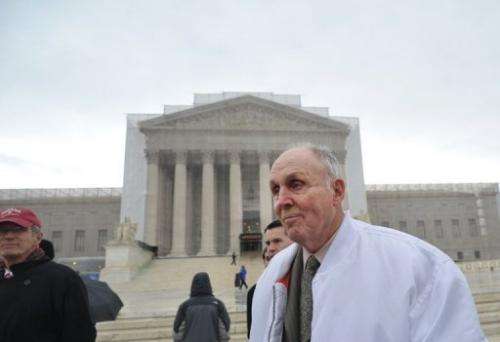US Supreme Court finds for Monsanto in seed patent battle (Update 2)

The US Supreme Court ruled in favor of Monsanto Monday over an Indiana farmer accused of having pirated the genetically-modified crops developed by the agribusiness giant.
The high court's unanimous decision focuses specifically on seed production, but experts say it may also have implications on intellectual property law in medicine, biotechnology and software.
The nine justices ruled that laws limiting patents do "not permit a farmer to reproduce patented seeds through planting and harvesting without the patent holder's permission."
The crux of the argument was over "patent exhaustion" which states that, after a patented item has been sold, the purchaser has "a right to use or resell that article," Justice Elena Kagan explained in the court's 10-page decision.
"Such a sale, however, does not allow the purchaser to make new copies of the patented invention," she added.
At 2 pm (1800 GMT) on Monday after the ruling, Monsanto stock was down 1.1 percent at $106.94.
In a lawsuit filed in 2007, Monsanto had accused Vernon Hugh Bowman, a farmer, of infringing on its intellectual property rights by replanting, cultivating and selling herbicide-resistant soybean seeds it spent more than a decade developing.
The patented seed, which allows farmers to aerially spray Monsanto-made Roundup herbicide over their entire fields, was invented in 1996 and is now grown by more than 90 percent of the 275,000 US soybean farmers.
The farmer, 75, said he had respected his contract with Monsanto and purchased new Roundup Ready seeds each year for his first planting.
But he said hard times forced him to purchase a cheaper mixture of seeds from a grain elevator starting in 1999, which he used for his second planting.
The mixture included Roundup Ready soybeans, which Bowman was able to isolate and replant from 2000 to 2007.
"Under the patent exhaustion doctrine, Bowman could resell the patented soybeans he purchased from the grain elevator; so too he could consume the beans himself or feed them to his animals," Kagan explained.
"But the exhaustion doctrine does not enable Bowman to make additional patented soybeans without Monsanto's permission (either express or implied).
"And that is precisely what Bowman did," she said.
The court found that the law rightly protects Monsanto from such a practice because, "were the matter otherwise, Monsanto's patent would provide scant benefit."
It upheld a lower court ruling demanding Bowman—whose lawyer has said is in dire economic straits—pay the $85,000 in damages Monsanto had sought.
Monsanto cheered the decision in a statement Monday.
"The Court's ruling today ensures that longstanding principles of patent law apply to breakthrough 21st century technologies that are central to meeting the growing demands of our planet and its people," Monsanto executive vice president David Snively said.
The company had been supported in court by the US government and, during the hearing, several justices already seemed disposed to rule in its favor.
Monsanto attorney Seth Waxman argued that Bowman was able to profit from the seed giant's technology without having to pay for it, comparing the case to software piracy.
The high court agreed:
"If simple copying were a protected use, a patent would plummet in value after the first sale of the first item containing the invention," Kagan wrote in the decision. "And that would result in less incentive for innovation than Congress wanted."
Although the decision specifically limited its scope to the seed industry, "there's one clause saying it may be broader," patent expert Michael Ward told AFP.
"Where the replication is not inadvertent, as long the replication is not a necessary but incidental step, that decision would apply," he explained.
© 2013 AFP


















